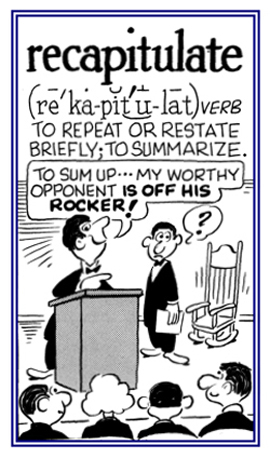The message said, "You're invited to the local pageant which tells the tales of yore in a dramatic fashion. So, be sure to bring your friend."
2. Caveat emptor, quia ignorare non debuit quod jus alienum emit or "Let a purchaser beware, for he ought not to be ignorant of the nature of the property which he is buying from another party."
The well-known shorter version, Caveat Emptor applies to the purchase of land and goods, with certain restrictions, both as to the title and quality of the thing sold. Out of the legal sphere and as a non-legalistic usage, the phrase is used as a warning to a buyer regarding any articles of doubtful quality offered for sale.
This legal terminology means, the purchaser (buyer), not the seller, is responsible for protecting the purchaser (himself or herself) in the transaction. Caveat emptor is the opposite of caveat venditor.
3. Under caveat venditor, the seller is assumed to be more sophisticated than the purchaser and so must bear responsibility for protecting the unwary purchaser.The purchaser, emptor, is a child who must be protected against his or her own mistakes, while the seller, venditor, is the big, bad wolf lying in waiting for Little Red Riding Hood. So while the two rules struggle for preeminence, attorneys gleefully watch—and litigate."
4. Cave canem means, "Beware the dog". This was used in Roman times and may be seen even now on some gates in Europe. Would anyone be warned sufficiently in the United States if he or she saw this sign on a gate?5. Cave quid dicis, quando, et cui strongly suggests, "Beware what you say, when, and to whom."
This is certainly good advice for all of us; especially, when writing e-mails or on social websites.
Recent studies have shown that e-mail messages may stay recorded somewhere for years and be available for others to read long after we thought they no longer existed.
A case in point is Bill Gates, whose videotaped deposition for the federal trial in the United States revealed that he couldn't remember sending an e-mail about Microsoft's plans to use Apple Computer to "undermine Sun".
Reading about, "The Tale of the Gates Tapes" in the November 16, 1998, issue of Time, the writer Adam Cohen, wrote, "At a key point in his war against archrival Sun Microsystems, Gates fired off an e-mail about Microsoft's plans to use Apple Computer to 'undermine Sun', but now he can't remember sending the message and has no idea what he could have meant by it."
"Trouble was, it was a difficult line to swallow. Gates as a fuzzy-headed amnesiac? This is the man revered even by the geniuses who roam Microsoft's Redmond, Washington, campus for his awesome 'bandwidth' (geekspeak for intelligence)."
At the very least, when someone is said to be off his or her rocker, it usually means that the person is behaving in a very strange or silly way.
Sally said, "I must have been off my rocker when I agreed to change jobs."
Several applicable words for off the rocker include the following:
- nutty as a fruitcake
- have bats in the belfry
- a basket case
- losing it
- lose one's marbles
- taking leave of one's senses
- mentally unhinged
- have a screw loose
Although the cartoon below is referring to another entry word, it is also providing an example of being off one's rocker.

Go to this Word A Day Revisited Index
so you can see more of Mickey Bach's cartoons.
Offer bright prospects to orthopedists.
Nostalgia is like a grammar lesson: A person often finds the present tense and the past perfect.
As a memory aid, I need ’em.
But they’d be more helpful later
If only I could read ’em.
That’s gaining increasing exposure;
Situations that formerly came to an end
Now have to be brought to closure.
We leave without apology.
Grown up, we swap kid stuff like you
For channeling and astrology.
All our computers are currently helping other customers.
May I transfer you to a person?
A black hole is a starcophagus.
Abstinence merits
Our consideration,
Practiced, of course,
In moderation.
I hope I do not live to see
The death of the apostrophe.
For readers all will suffer fits
In disentangling its from it's,
And they may also rave and rant,
Unable to tell cant from can't;
Not to mention how they feel
When they mix up well and we'll.
2. Neglect of reading challenging materials.
3. Lack of stimulating conversation.
4. Avoidance of challenging word (vocabulary) acquisitions from a variety of perspectives.
It’s not what you get, it’s what you keep that counts!
Groups of Word Challenges so you can test your vocabulary skills.
